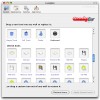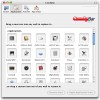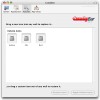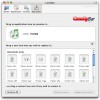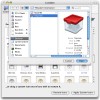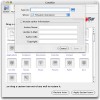Customization has always been a big part of Mac culture, and icons have always been a big part of that. We've been changing the icons on our files and folders since before other operating systems even had icons. In the old days, icons used to travel from user to user by way of floppy disks and were often hoarded in large collections. Today, with the Internet providing a means of sharing, there are countless icons out there, and the need for hoarding is long gone. However, with the large number of icons floating about, we now need methods of working with large collections of icons easily. Enter CandyBar.
What is it? CandyBar is an application that makes it easy to share and change large collections of icons. To accomplish this, it works with icon libraries called "icon containers". A container can contain hundreds of icons, complete with their target applications.
When you open up CandyBar, you are presented with the main, and incidentally, only window in the program. Inside this window you will see a heap of icons. In order to keep the number of icons within manageable numbers, the window is split into several tabs. The first one, and the one that you will see by default contains all the system icons. These range from the icons for clippings and drives such as hard disks, CDs and memory sticks, to the icons for the Pictures, Home, Desktop and Document folders.
The second tab holds all the icons for the programs installed in your Applications folder. It will not look for programs installed outside the Applications folder, which is a limitation since it gives you no option to scan for programs in a certain directory.
The third tab holds the icons for the volumes you currently have mounted. This is a bit superfluous since there are not that many to begin with, and it if you are even remotely interested in icons you have probably already changed them.
The last tab can be used to change the icons of any given application. I am not referring to the icon of the application itself, which can be changed normally, I am referring to the icons that files created by that application will have, like for example the icons for MP3 files that are associated with iTunes. Dragging any application into the well in this tab will open it and scan its resource fork for icon resources and display them.
So what's the big deal? Well, for one thing, you can open icon containers. This means that you can open a single file that has all the necessary information to automatically assign the icons inside to their respective folders or applications. Then, because of the way that CandyBar works, it is not simply pasting an icon in the get info window of that file or folder, but actually changing the default icon that the file or folder automatically receives. This translates into several things. One, you only need to change the default folder icon once, to have all folders with no custom icons, and all folder that will be created from now on look the same. Second, if you had already assigned a custom icon it will not be lost. Thirdly, if you take that file or folder and move it to another computer, it will have the default icon for that computer. This means that if you and a friend both have customized default folder icons, a generic folder will look different on your computers, and will be in tune with other folders, on the same computer.
There are several things that could be better, such as being able to change the size of the icons in the CandyBar window, or see a list of the icons inside the container. As it is now, the icons are always a set size, and the icons in the container automatically are assigned to their respective wells. If you wanted, to say, only take an icon from a container and use it on your hard drive, you would have to open the container, remove all the icons that you don't want, apply the one icon that is left, then relaunch the Finder for the changes to take effect, copy the icon from where it was applied then paste it on your drive and then change the icon back to what it was, and then relaunch the Finder. Complicated? Yes, it is. Fortunately, besides opening icon containers, you can also save your own, making it easy to switch between 'flavors' to suit your mood.
The Good CandyBar makes it easy to change a very large number of icons with just a few clicks, as well as save your changes for sharing with others. Because of the way it works, it will preserve custom icons and the changes will only be visible on your Mac.
The Bad Hard to use just one icon from a collection, cannot change the size of the icons so you can see them in all sizes without actually applying them.
The Truth This program is a new take on working with icons, not surprising seeing how it comes from the people at IconFactory, one of the most popular sites for free icons on the Internet. Who know better how to mess about with tens of icons at a time except the people who make them? The program is great, but could use a little work to make it possible to work with just a few icons.
Here are some screenshots, click to enlarge:
 14 DAY TRIAL //
14 DAY TRIAL // 